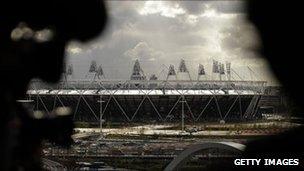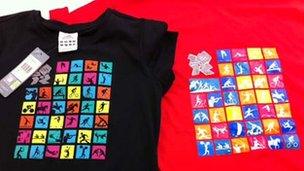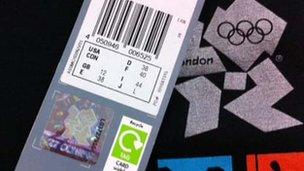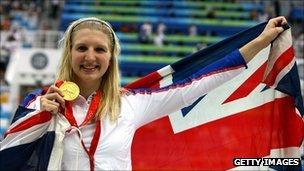London 2012 Olympics fraudsters on their marks
- Published

London 2012 could prompt high spending on the legitimate and black markets
In eight months time, athletes on the Olympic track or cyclists in the London 2012 velodrome will be seeking out their opponents' weak spots and taking the chance to strike for gold.
Outside the Olympic Park, fraudsters and counterfeiters will be doing much the same, as they try to trick the many visitors to the Games out of their money.
From accommodation and parking to tickets and merchandise, these con artists will be taking every opportunity to make money from the festival of sport coming to the UK.
That is the warning from trading standards officers, police and consumer groups as the build-up to the Olympics continues.
So far, there have been relatively few reports of scams connected to next year's Olympics. Some counterfeit London 2012 lighters were seized in Coventry, while some clothing copies have been found on an internet auction site.
The massive ticket sale included the launch of a website checker, external, put in place to help people cross-reference whether a reselling website was legitimate.
However, at the launch of the "Good Sports Don't Fake It" campaign for National Consumer Week, experts lined up to warn that more cases should be expected in 2012.
While security may be tight at the sporting arenas, opportunities are likely to present themselves in other areas.
Mark Smith from Operation Podium, run by London's Metropolitan Police, says that other sectors that would expect to benefit from the influx of visitors could be at risk of fraud. This includes the illegal sale of theatre tickets.
"The criminal economy is worth millions of pounds," he says.
Elsewhere, rogue businesses could attempt to rent out parking spaces close to venues, contravening the rules of residents' permits, according to Teresa Perchard of Citizens Advice.
"We need to get ahead of the game for issues that are just around the corner," she says.
"Businesses might be tempted to cut corners because their finances are under pressure."
She adds that there are reports of tenants being given notice by landlords who believe they can charge more for property close to an Olympic venue.
Deposits have also been paid for properties in the capital that may not even exist, she says.
Hologram
Many major events sell official clothing, with a busy trade in unofficial merchandise going on at the same time.

Some copied t-shirts have already been discovered - the official London 2012 shirt is on the left
Mike Roylance, brand protection manager for Adidas, says he is expecting "a tidal wave" of fake Olympics clothing appearing after Christmas.
Stretched family finances could lead some consumers to buy unofficial items. One T-shirt was being sold at half the price of the official one on an internet auction site.
But Mr Roylance warns that the lack of quality control could lead to counterfeit clothes falling apart or colours running after the first wash.
All London 2012 merchandise - irrespective of brand - carries a hologram of the official logo as well as a unique item number.
Websites such as Brand-i , external allow shoppers to check whether an item is from a genuine stockist.

Holograms denote official London 2012 merchandise alongside other anti-counterfeiting measures
Mr Roylance expects much of the fake clothing to be manufactured in the UK and possibly sold from the back of vans at service stations, car parks and outside stations.
However, research by the Trading Standards Institute (TSI) shows that brand protection managers have their work cut out.
Albeit in a small sample survey, a quarter of those asked had bought sporting merchandise from an unofficial website, and 11% had bought it from a car boot sale, street market or stall.
Ron Gainsford, chief executive of the TSI, admits that local authorities do not have enough officers to walk the streets looking for fake goods.
Instead, intelligence shared between the police, businesses and trading standards officers is key to tackling counterfeiting and the criminals involved in it, he says.
And he urges shoppers to follow a checklist including choosing shopping outlets and websites carefully, not being drawn in to offers that are too good to be true, checking for authentic branding, alerting authorities to fakes and keeping a copy of orders and receipts.
He also draws on the experiences of athletes who have suffered at the hands of fraudsters.

Rebecca Adlington's parents were the victims of an Olympics tickets scam
Ahead of the last Olympics in Beijing, the parents of gold medallist swimmer Rebecca Adlington spent nearly £1,100 on tickets they had ordered from a website which turned out to be a scam.
Three men were jailed in July for their part in the £5m fraud.
"Please do not find yourself in the position we were in," says Kay Adlington.
"It was such a devastating experience. Make sure you establish the credentials of whoever you are buying from, then check, double check and check again.
"Whenever possible, always buy from the official website using a credit card. The best way to genuinely support our athletes is to buy genuine goods, rather than fakes."
Meanwhile, high jumper Ben Challenger lost £600 after he bought a bicycle frame on the internet and discovered that it was fake and unsafe.
He is hoping for better luck for himself - and less fortune for the fraudsters - in 2012.
- Published24 June 2011
- Published21 November 2011
- Published21 November 2011